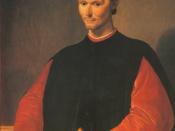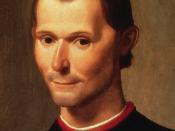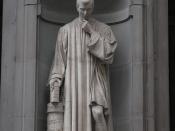Niccolo Machiavelli's book, "The Prince", examines the statecraft that should be employed by prince's who wish to keep their principalities or kingdom. Many of Machiavelli's suggestions are very practical and rooted more in establishing a united state rather than the betterment of the people. In this Machiavelli differs from his predecessors of the middle age who wrote mainly for the betterment of man's nature rather than a unified, powerful state.
Machiavelli's view of people take's a large part in shaping his views about how one should run a principality. He tends to pigeonhole people according to their status when gauging how they will respond to certain measures. Machiavelli hardly allows for any inconsistencies within certain groups. One is either for or against the prince and therefore either for or against the state. He allows for very little grey area in the feelings of people for the state. One of the only times in which Machiavelli allows for ambivalence towards the state is under new principality that is gained through armed seizure where those who benefit from the new state have only "lukewarm support" for the state and "generally incredulous."
The general population is portrayed as a rather malleable, unintelligent section of society. Machiavelli has his prince treat them much like a herd of cattle. All one has to do is let them be and occasionally guide them when they go astray. Machiavelli counsels his prince to go and live among conquered people so that he can see trouble from the start and fix the problem before it can be serious.
Machiavelli also advises removing people from conquered territories and transplanting into their spots people who are surely loyal to the prince. According to Machiavelli they cannot become a problem because they are scattered and poor. This prevents organization of...


